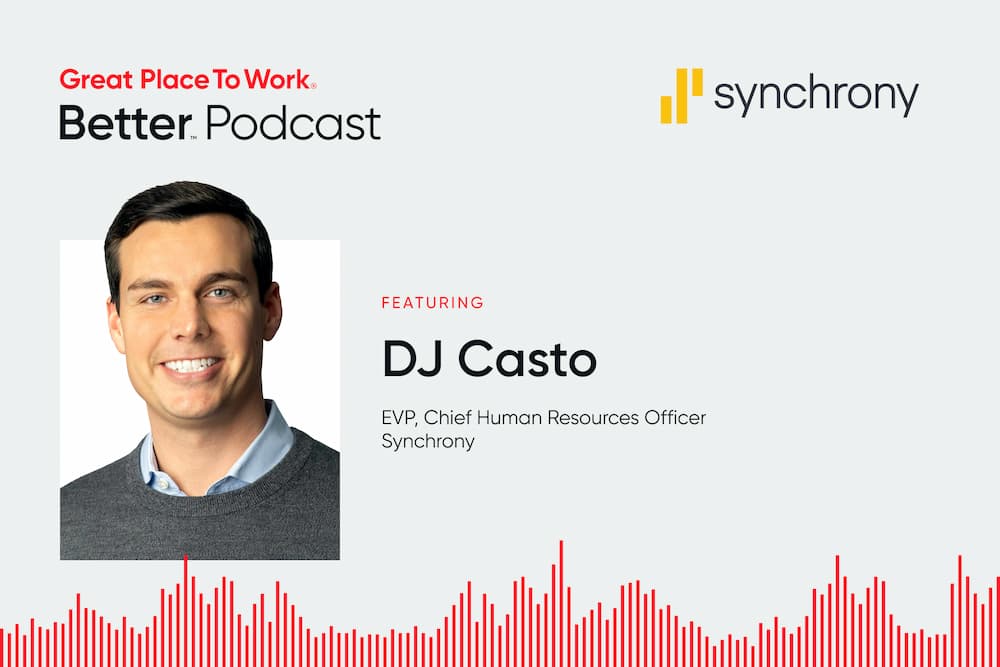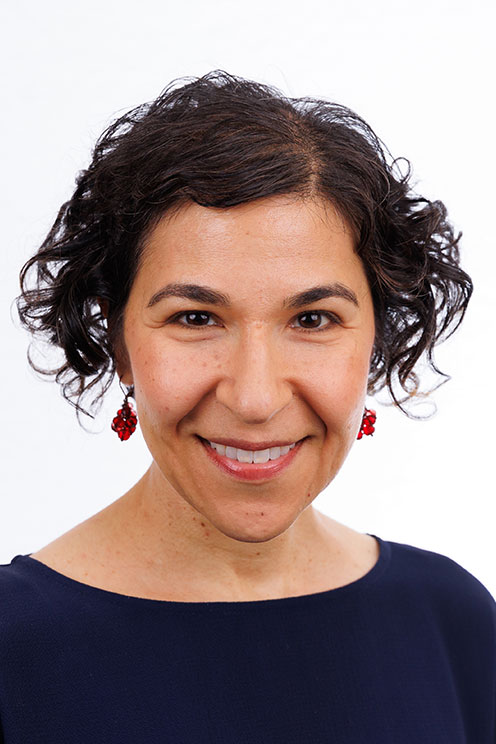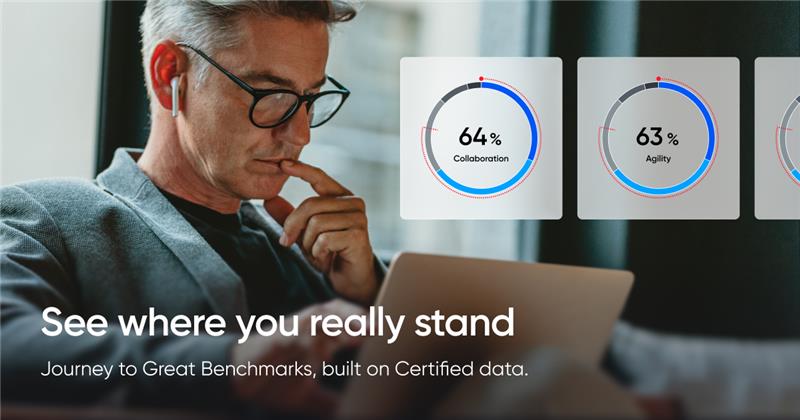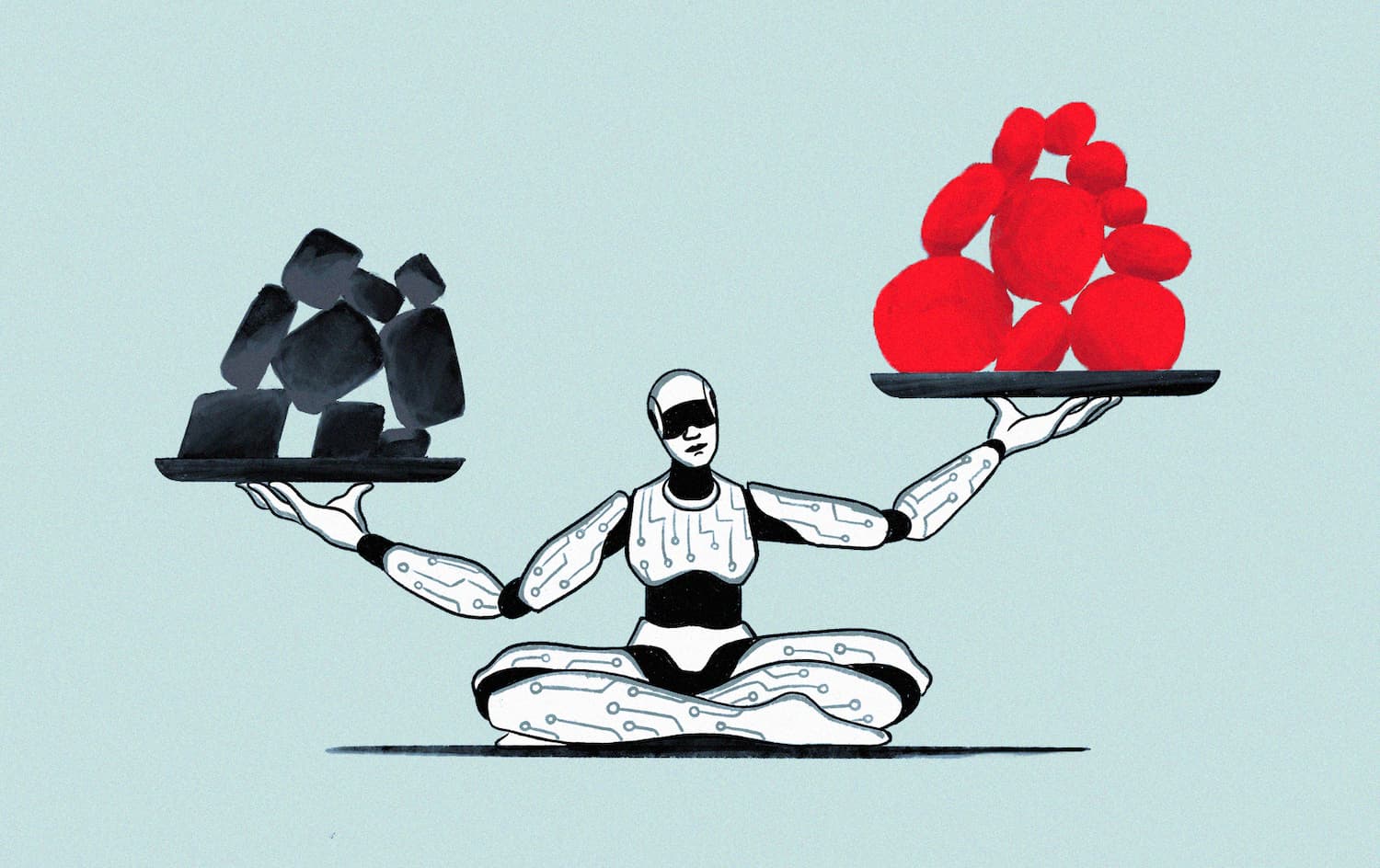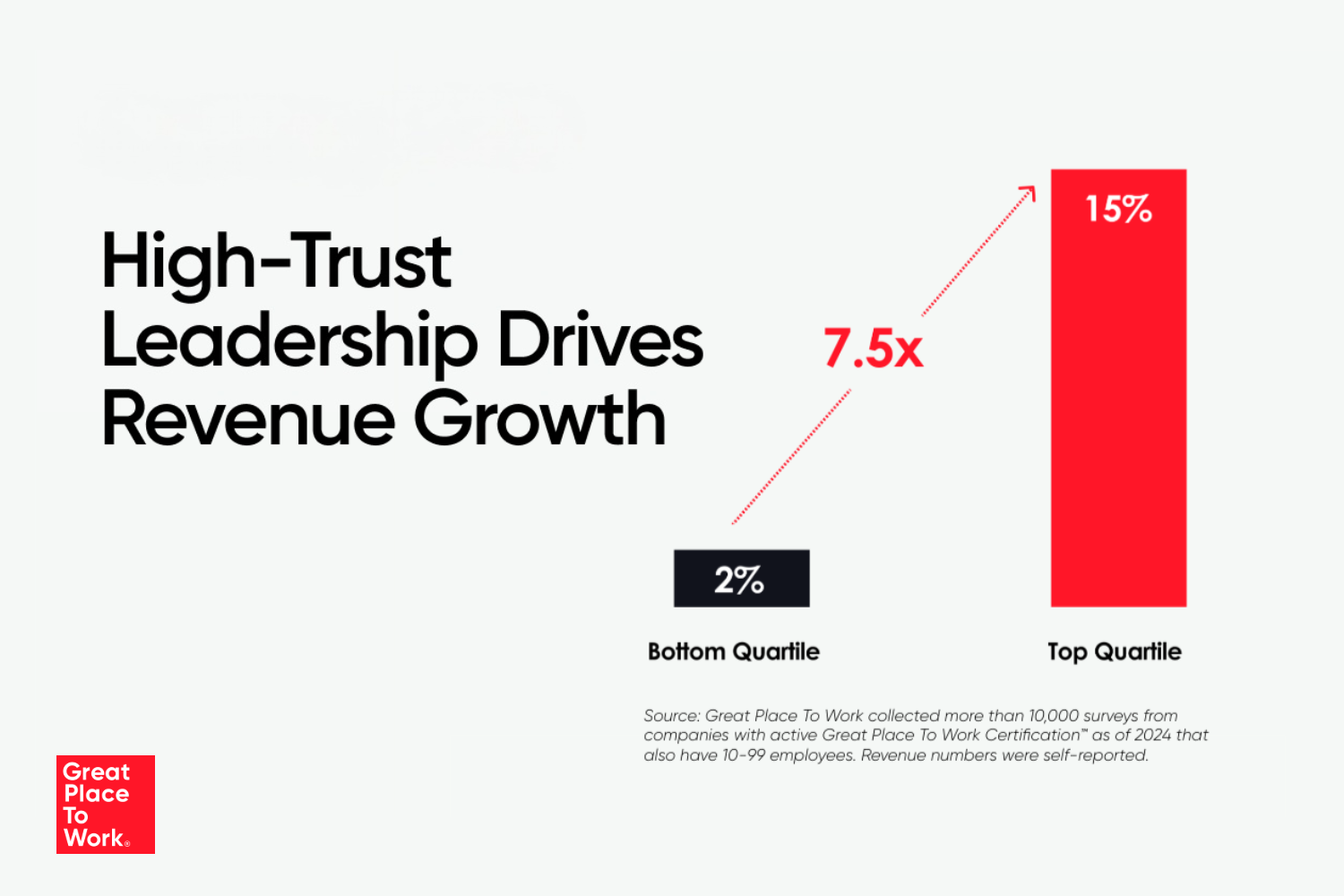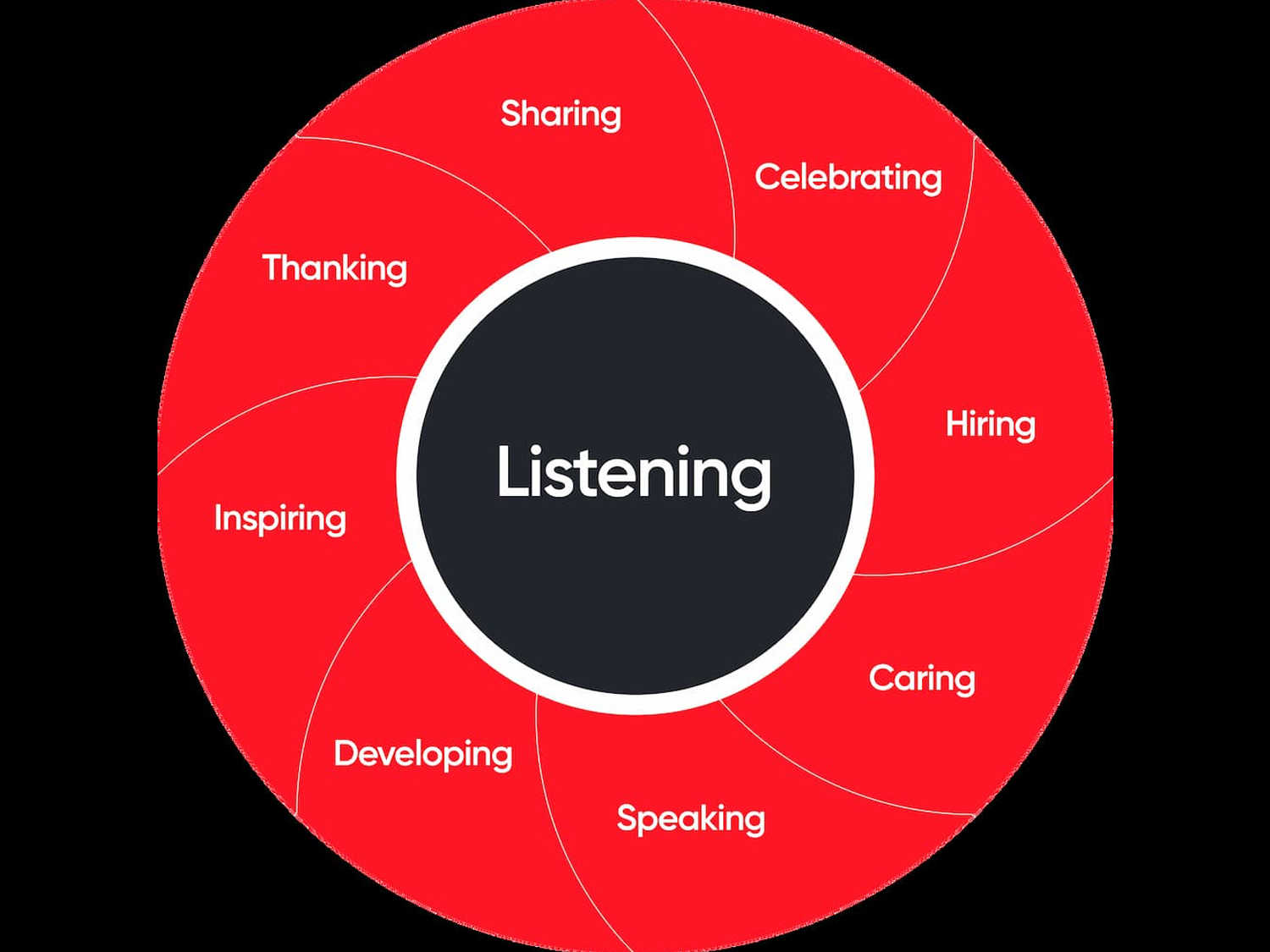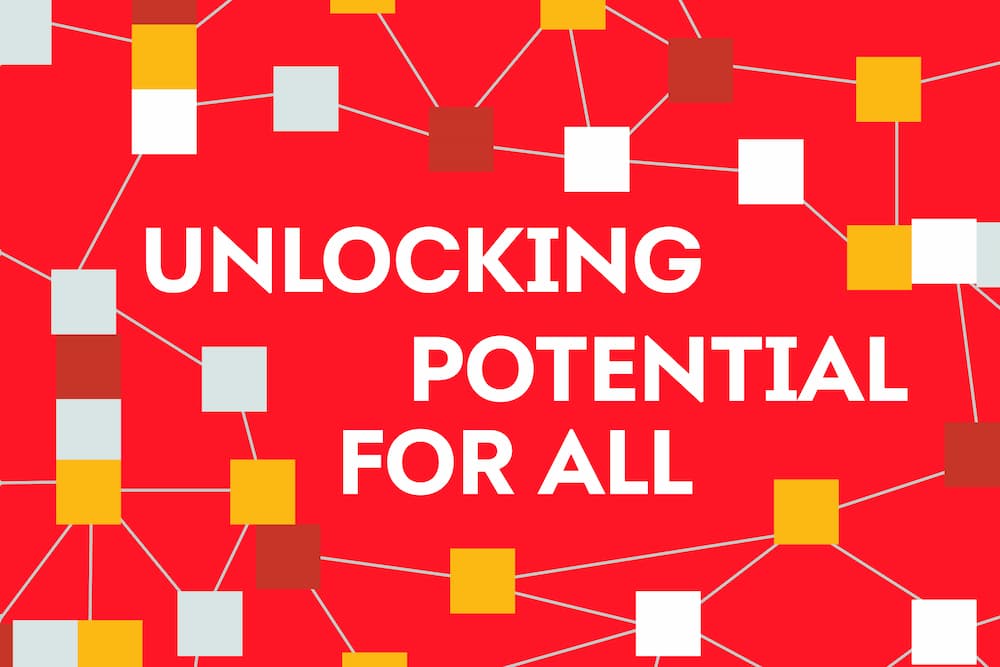High-trust leadership, Leadership & Management, Listening
In today’s workplace, strong leadership is not optional — it’s the foundation of business success.
DJ Casto, chief human resources officer at Synchrony, shares how the company has redefined what it means to lead by making listening, openness, and collaboration central to its culture.
The company’s leaders set clear expectations and encourage everyone to speak up, share ideas, and work together. Synchrony’s commitment to listening and co-creating with employees has helped the company move faster, adapt quickly, and boost revenue.
Make listening a priority
Synchrony, already a thriving organization, reevaluated its leadership values during its 10th anniversary to make sure they were still meaningful and to clarify what was expected from leaders.
“Do we think that these values have stood the test of time? And the great news is we did. They’re beliefs that our employees truly connect with … but we felt like we could do a better job explaining the expectations associated with each of those values.”
Synchrony didn’t just talk about new leadership ideas—they put them into practice. They started “Impact Sessions,” which focused on leadership behaviors. The most important being listening. CEO Brian Doubles wrote down leadership expectations and encouraged leaders to ask questions like “what if?” instead of saying “we can’t.”
They also used a feedback method called “knee-to-knee,” where after a conversation, leaders check in the next day to ask, “What did you hear?” This helps make sure the message was clear and the conversation was useful.
Co-creation with employees
Synchrony changed how decisions are made. Instead of leaders making all the decisions and employees following along, they started working together to create solutions.
For example, when summer interns said they needed better access to mental health support, Synchrony hired a psychologist to be available at their office three days a week. They made sure employees knew this person was independent, so everyone felt comfortable using the service.
This story shows how listening to feedback and making changes based on what employees say can lead to better results.
Advice for leaders: trust and feedback
DJ’s advice for leaders is to build trust by communicating regularly, like through surveys. He does quarterly and sometimes monthly surveys to hear from everyone. It’s important to focus on changes that will benefit most employees and have a real impact.
EMBED CLIP.
Roula Amire (00:18):
Welcome to Better By Great Place to work the Global Authority on workplace culture. I'm your host, Roula Amire, content director at Great Place to Work. Today I am joined by DJ Castow, EVP and Chief Human Resources Officer at Synchrony. It's not the norm when we see a company proactively change leadership behaviors and expectations when things are going well to become even stronger. But that's exactly what Synchrony has done. DJ told me about how transforming leadership expectations around behaviors like listening has significantly impacted their bottom line. It's also led to new programs, products, and a culture where co-creation with employees is the norm. I look forward to hearing your thoughts on this approach. Listen in and enjoy. Dj, welcome to the podcast. Thanks for having me. Good to see you again. It's great to see you as well. This is a bit of deja vu because the first time we met each other, it was also in a podcast booth after I interviewed your CEO Brian Devils.
DJ Casto (01:25):
I recall it was a great discussion,
Roula Amire (01:27):
And I remember this because you came up to me and introduced yourself and I thought, oh, I know who you are, your dj, and that meant so much to me because I was so new. Some unexpected kind feedback really goes a long way and that has stuck with me because I was new to great Place to work. I was new to podcasting and just have someone who I'd seen and heard and read about in my prep come over and say, Hey, you did a good job.
DJ Casto (01:54):
Well you did. It was a great job for that. You do a nice job pulling the story out and making it more of a conversation. And I think that's what listeners want
Roula Amire (02:01):
And we're going to do that today. Okay. All right, so let's get into it. So today you're in the chair and I'm glad because there's a lot happening at Synchrony that I want to get into. Over the last few years, your stock prices has doubled. Your turnover is at an all time low. Your job applications are up, and your number two on Fortune's a hundred best companies to work for list in 2025, up from 44 in 2020. Those are very impressive returns and results, but it's how you achieved all of this that is so rare. What you did primarily was redefining expectations for leaders. Working on the nine high-trust leadership behaviors like listening, embracing mindsets like vulnerability. That's not easy to do for anyone inside or outside of work change transformation. It can be hard. We generally avoid it at all costs unless we have to. Take me back to when you first started this, why go down this path?
DJ Casto (02:59):
I'm fortunate that I have a CEO and a senior leadership team, so my colleagues that understand and believe that for people to be their best, they need leaders and coaches to support them. And if we help our people be their best both personally and professionally, it will drive peak performance for the business. And we've seen the results and we continue to lean in to that. And so I think what I loved is we hit our 10 year anniversary as a publicly traded company and we took a moment to reflect on our values and my CEO and the leadership team kind of got together and said, do we think that these values have stood the test of time? And the great news is we did. They were embedded their beliefs that our employees truly connect with and are operating, but we felt like we could do a better job explaining the expectations associated with each of those values.
(03:51):
And I think that work has really helped us to be clear and articulate on what we expect of every leader of Synchrony and that it is a privilege to be a leader, to be a coach, and that you need to be all in on creating that space and investing in each of your people in a way that helps them be their best. And that there is always this direct correlation to performance. If you can lean into helping that individual reach their peak performance, the company will reach its peak performance. And that correlation of the employee experience and the customer experience, these aren't just buzzwords. We are seeing the direct connect of all of that. And I think that is what has come through in our results. And even for our shareholders, what they're looking for is us to provide a company that can stand the test of time, that can be resilient in all the different market challenges and different ways in which competitors are coming at us.
DJ Casto (04:44):
And they're not looking just at our short-term, but they're looking at our long-term success and to us investing consistently in our people being very clear on leadership expectations. It's shown up in our business performance. And isn't that the way I believe every company aspires to create a space where you do the right thing for your people and they show up in a pretty beautiful way to provide outstanding performance.
Roula Amire (05:10):
So let's get into some of the specifics. You brought senior leaders together for a few days called Impact Sessions to bring these new leadership expectations to life, particularly around listening, being the number one leadership behavior. What did you learn from that initial process and how do you listen differently now? How does that show up for you now?
DJ Casto (05:31):
Yeah, I mean for us, we've been really thoughtful to make sure that as we roll out leadership expectations associated with our values, that it does not become a marketing campaign. That there's truly this linkage that this can be the how with regards to delivering our short-term goals and our long-term strategy. And so we were very intentional that Brian, first of all was the author as our CEO, that he took pen to paper and put down some of these that you're referencing, like active listening, asking what if versus we can't, which is a really interesting reframe for a leader to take through with their team as you're thinking about meeting kind of the strategic imperatives of the business. So we linked it with our annual senior leadership meeting where we always unveil our short-term goals and our long-term strategy. And then we said that this isn't just going to be a moment in time, it's not going to be a meeting where we talk about it.
(06:24):
We're going to spend a year with our top 300 leaders really unpacking each of those expectations. And then what really helps people learn and understand the importance is experiencing it, right? And so we tried to create a three day session where first and foremost, they had access to our CEO. So he came in and set the tone on each one of those meetings, did a ask us anything with those leaders. So, hey Brian, can you provide me more details around what you mean there? We brought several of my colleagues into the session so that they were kind of ambassadors of these expectations and tied it to specific business objectives. Hey, we're trying to double the size of our health and wellness business. Okay, let me show you some examples of how one synchrony behaviors around how we operate as one actively listening to our employees, to our consumers, to our partners can unlock greater growth in the company.
(07:19):
And so what we tried is to curate a lot of impactful moments of learning through one-on-one conversations with the CEO, the top leaders, time to really allow those learnings to set in and safe spaces to talk about, well, here's what I see working and here's where I need to lean into a little bit as a leader. And then the one thing we were trying to pull through on all of this is the power of active listening and trust. If you really want to go back to your teams and unlock their full potential, you can't go through the motion of listening. You got to go through that authentic active listening and really pull out the insights that you're getting from your team. What are the roadblocks? What are the obstacles? Here's where we want to take the company in the short term and long term. Give me the honest and candid feedback. And we actually anchored candor to our value of caring. And I think that linkage is really powerful, right? If you really care about the individual or the work, let's be candid in a very responsible and respectful way of what's working and what's not working.
DJ Casto (08:19):
And so we tried to create, again, safe spaces for them to experiment as leaders and as top leaders, you don't get a lot of opportunity to do that. And that's the other thing I really appreciated from Brian is he's like, no, invest in this team. Make sure that we're spending a year with them first before we roll out these expectations across the entire company. Pair 'em with individuals that they would not naturally be paired with so
DJ Casto (08:43):
That they could start to have conversations. We're a regulated bank, and so we have our first line operators, our second line risk teams, our third line auditors, where's these natural places where we could pair some of them so they could have some discussions on that? We're not in conflict of one another, we actually have the same goal. So again, back to these key questions, let's ask ourselves instead of saying we can't do that, what if we reframe how we're thinking about doing it to unlock that short-term objective or to start investing in that long-term goal? And so these aren't just what you tried to move from conversation to action and help give them the tools and resources to bring that back with their teams.
Roula Amire (09:25):
If someone's listening a leader and they say, well, I listen to my people, how would you describe active listening? This is something very different. And again, not many companies do it or work on it or even understand it. So how would you illustrate that for a peer?
DJ Casto (09:42):
I'll give you a great practical example that we brought into the sessions. So we actually partnered with West Point. They have a leadership institute called Thaer where a lot of the retired military generals and key leadership roles as they retire from their formal roles, one of the things that they are principled around are sort of how leadership shows up. And obviously they're having to navigate this at times of much higher crisis than we can even imagine as they're trying to think about the scopes of their role. One of the kernels that was a part of each of our sessions, one of the things she discussed with us is preparing for the feedback in the conversation. Oftentimes we think we've delivered the feedback or we've done the listening in our head, we check the box that we had the one-on-one discussion, I told the employee what I needed, I spent 10 minutes listening, and now I can check off that I've had that conversation.
(10:37):
She recommended to us that after the conversation happens, after you've given the feedback and after you've done the active listening the following day, she called it a need a knee where you're basically right in front of the individual. Tell me what you heard. I know we just had a really important conversation around this business objective or performance area that I'm asking you to focus on. What did you hear? And just taking that moment to take down after the conversation has happened, you're giving yourself credit for doing it. Did what you hope get accomplished get accomplished? Did the employee interpret something or misinterpret something? Did they really take away the highlight that you're wanting them to take through? And I think active listening is a continual process. And so you've got to build in to kind of your day-to-day practices that yes, you feel good that you're giving access to your team. I am really good about doing my one-on-ones, but are you really good at taking the insights and information and making sure that that conversation had the impact that you intended? And that takes work. And we talk about that with our teams, that you have to be intentional about all of this, right? You can't just go through the motions. Active listening means that you're taking the insights and literally moving to action. And action might just mean another conversation or a deeper conversation or through those learnings, it's a bigger opportunity than you even thought it was.
(12:13):
Because as leaders, the worst thing we can do is stop active listening because that's when we stop being connected with how the work is really getting done. So we tried to powerfully illustrate that the simulation, that was fascinating. So you've got these top 300 leaders that are really good at cascading the message, let me rally the teams, let me tell you what I expect. And sometimes there's a disconnect to what they think their teams are hearing versus as it gets deeper in the org, how they're interpreting it.
DJ Casto (12:45):
And so we got to take them out of those roles of leading the message and they became receivers of the message and all of them walked away being like, oh, there's so much more I can do to ensure the clarity and also the feedback loop. And this is what Great Places to Work is such a great partner with us on, and we've got a lot of great tools we use with them. But to really build trust, you have to actively listen. And so just sending the message without going back to all levels again, this should be for all leadership. So make sure that you're hearing the message and going back and having those discussions with every cohort in the organization. So those are just a couple examples that I think really resonated with our teams to say, okay, here's some ways in which I should rethink how I'm leading
Roula Amire (13:29):
As you're talking or living. I mean it's communication fundamentals that we all need to work better on so people feel heard, feel seen, inspired in the workplace and outside of the workplace. So I am sure this work has a ripple effect in your life outside of work,
DJ Casto (13:46):
What we do say part of the work we do on the employee experience is how do we help you personally and professionally to drive your peak performance? Because to your point, the two are connected. I hear a lot of terms thrown around work-life integration, all these different ways in which you can reframe it all good, but I just say it is meaning work and life. You are so interconnected on both. And if you are not at your peak in one of those two areas, it'll show up for us. Hopefully the tools and resources around how we think about leading to your point can be applied to both personal and professional.
Roula Amire (14:24):
And a takeaway for the listener is one of the many is you didn't assume leaders knew how to change their behaviors. You didn't say, listen better, be vulnerable. You showed them, train them and help them. And that's really important. You also change how you develop products. Typically leaders create things and employees execute them, but you flip the script and now you co-create solutions, programs, products with your people. Can you describe what this co-creation process looks like using an experience you had and what the result has been?
DJ Casto (14:58):
Yeah. I will tell you this is where probably I have pushed myself and my team the most, and I have to really thank one of my colleagues, Carol Jewel, who is our chief technology and operations officer. She's been a huge champion of agile methodology and thinking it typically starts in technology, but she's been a champion around how you can apply certain principles across the entire business. And so for many of us, we've been trying to take some of those principles in figuring out how could they be relevant to some of our functions that traditionally don't use that methodology. And so we have started to adopt minimal viable products. I look at our offerings to our employees as products, how do we help them be their best? And there's got to be kind of a la carte menu of offerings. Traditionally, if we go back in time, I think our function looked at this kind of like an annual process, and none of our businesses operate in an annual process anymore.
(16:01):
The world is too dynamic. You have to move to more of a quarterly cadence at a minimum, although some things like traditional medical benefits and things that you have to negotiate with a specific provider and vendor, you're going to still go through an annual event and exercise and you're going to collect feedback. But there's many things that we offer across the business that we could stand up as an MVP. And I'll give you a couple examples. And I've heard my CEO say this a variety of times, and it's true. Most of the ideas that we get on how to unlock both the employee experience and the customer experience better start with our employees because they're the ones experiencing it. They see the friction point with the consumer or they see the friction point with themselves on, Hey, I wish this was easier. I wish this was frictionless. I wish this was more seamless. I need to break down this barrier of access.
(16:50):
And so for us, we've tried to look at things that we would've traditionally said, okay, we'll put that in a backlog. We'll put that in a queue, we'll look at it next year, and instead say no. If we are starting to see an employee population truly say that there's a need, why can't we stand up an MVP? Some people think of it as a pilot, right? A smaller pilot where everything's not worked out, you don't have it a hundred percent baked, and you're honest with the workforce around that to say, Hey, here's the need. We're thinking about a couple solutions. Which one do you think could be the most impactful to what you're trying to solve for? And then we're going to stand this up for 12 months and we're going to test and learn together on does it meet the need that you're looking for. So I'll give you a couple real examples.
(17:35):
So the first, every time I have our summer interns together at the end of the internship, we always facilitate an experience on, Hey, tell me as we move to extending offers, what is really important to you from the company? What's important from an offerings perspective? What are things that you want to see and get access to? And it's just a really great exercise for us to go and say, okay, are there ways in which we need to reframe things because this is the language or this is what connects the most with development or career experiences. And then sometimes we'll get great net new insight on a offering that we need to provide a benefit product. And two years ago, the class we had, it was over 70% said that the number one benefit that they're looking for is access to mental wellness, access to a therapist on site because there's a real barrier to entry
DJ Casto (18:38):
Because of the need and the lack of professionals out there, and a lot of them do not take insurance. So there's also a financial barrier for people to get in. And so they need this resource, they need a therapist to help them unpack some of their mental wellness needs, but sometimes they have to wait six months to gain access to it. Well, that's not that correlation doesn't work particularly when you have that moment of need.
(19:00):
And so they said, it would be wonderful if we had something on site because we're all here and our campus program is all located within Stanford and New York City. We did that intentionally to create a sense of community and give them a variety of experiences. And so we said, okay, and we went out and looked for an individual that could maybe help us in this space, and we brought on a accredited kind of psychologist to help us, and she is onsite at our Stanford headquarters three days a week providing access. And although the benefit was born out of a cohort of early career, we have seen it cut across the multi-generational workforce that we represent. And we've changed a couple things. We've learned people wanted clarity that this was a third party, this wasn't a Synchrony employee. They wanted to understand the rules of engagement. This isn't permanent, but it helps to provide that bridge. So if you need the six months before you get access to your permanent resource, you can leverage her for those type of things.
DJ Casto (20:00):
And so we clarified, we changed hours, we worked on the way in which we communicated, that's the power of an MVP, and then we've published more broadly, and then our hubs found out about this resource that art in Stanford. And so we've started to provide virtual resources to compliment that where I can't have that resource in every hub and some of my hubs are completely virtual, but I can get access to a wellness coach across the board. And so that's just one example of taking the feedback, doing the act of listening, moving to action, but being very clear that we're going to experiment in that first year fine tune things and make sure that the ROI is there, that it actually is meeting the need that was initially described.
Roula Amire (20:41):
That's a great example. If I put myself in the chair of someone who's listening who's a peer of yours, and they say, oh, co-creation, this is ongoing. It's not just this program. This was one of many examples you shared with me. If they think, well, we can't do that, how would that work? Our employees might have lots of ideas and we can't do them all. Do you have any tips on things that they should, like the mindset they should have or a tip or two to get started or how they should think about this? Why is this the way of working at Synchrony now, this co-creation method?
DJ Casto (21:15):
I think what co-creation does is it allows you to build greater trust in your workforce. So I assume the listeners are going to be anchored to great places to work. So there's already a buy-in that they believe in this trust-based model and that trust drives better engagement, which drives greater performance. I always look at, okay, if that's my belief, which I'm all in, then what are the ways in which I gain more trust in the ecosystem through my employee voice? And I do all of this pulsing. I leverage. I don't just do an annual survey,
(21:48):
I do quarterly surveys. Sometimes I'll do a monthly targeted survey because I believe surveys allow a forum for you to provide access to all to provide feedback. I love a round table, but a round table sometimes will exclude a point of view or a perspective. I always say Great places to work, data doesn't tell me what to do, it tells me what to listen for. And so if I see something that's coming through the data that everyone had the ability to provide me feedback for, well then I'll go start to do some round tables that help me to understand, okay, I'm seeing this. I'm hearing this. Either the data's going down or there's a comment that's being shared in the comments. Help me understand what you think you or your colleagues meant by that element. And so for me, once you collect all that feedback, where you can actually lose trust is if they don't see you taking that feedback and starting to move to recommendations and actions.
(22:42):
Now, I always am honest with my workforce, that doesn't mean that you get this manifesto of requests that just because you've put it there that it's going to happen. I've got to make sure there's a real ROI for the majority of my workforce because our job is to provide experiences either through learning and development or benefits or career advancement that gives access to all. And so how am I doing that? And I have to put my list together through those listenings, not dissimilar to how my product teams think about through the consumer feedback that they get.
(23:15):
And then you've got to prioritize that list based off of our goals, right? Okay, will that help us help our employees reach their short-term goals or our long-term strategy? And as a function, we should be using the same methodologies that our colleagues are using on the product side of the house, on the growth side of the house. And that's where this cuts across directly, and it's why I'm so passionate about it. And so we co-design things together for our consumer. We'll go out and do an MVP on a product with one of our partners to provide greater access to credit. Why wouldn't we do that for our employee base? And when you're honest about that, you can also just say, Hey, if it's not hitting the list, it's not hitting the list because we have a prioritization way of doing this. And right now we haven't seen an aggregate theme that this is a need for all, and we haven't been able to link this to some of our short-term goals and long-term objectives.
(24:08):
It doesn't mean we're not hearing you, we are, but just like everything in the business, we got to prioritize and hope You can feel that we've got these loops to continually look at it and on a quarterly basis, we'll continue to look at our list. And if quarter by quarter we see a need shift, well that might mean that our next MVP, our next pilot actually goes from being in fifth position to first position. Why? Because we're trying to give you what you need to be your best both personally and professionally to again, drive peak performance for the business.
Roula Amire (24:36):
And you can do that because you're soliciting feedback
DJ Casto (24:39):
Constantly. Again, it's a part of our DNA now, right? Great places to work and the great places to work survey and even the number, I love the number, but I love the number because our employees told us that they are feeling this consistently across all levels, and I'm very clear to in our business as well, great does not mean perfect to me. A great places to work is one that is continually asking for feedback and is continuously trying to improve and being honest and transparent to the workforce about that. It's when you stop listening and you stop trying to improve that, I think great companies start to fail.
Roula Amire (25:14):
Exactly. And they probably have that checklist mentality, oh, we've reached this, we've gotten there, we're done. We're good, and we know what happens then.
DJ Casto (25:23):
Exactly. You never arrive. It should always be continuous improvement.
Roula Amire (25:32):
Hey everyone, if you like listening to the podcast, then don't miss the Great Place to work for All summit in April in Las Vegas where you will learn from the best in the world, meet more than 1500 leaders and get insights on what the data says drives business success. And that is people and culture. I promise you. Leave inspired and ready to transform your workplace. Use the code better to save 20% off registration, linking coder in the bio. Don't miss out and I'll see you there. If you could go back and give your younger self advice, what would it be?
DJ Casto (26:15):
I think for me it would be to cherish every moment and life experience. I think oftentimes we're so caught up in what's next and how do I accomplish X, Y, and Z? That as you do a look back, it's interesting on the things that you really cherish. It's those special moments. It's a family celebration. It's the birth of a child. There are these moments that oftentimes you're just living in it and you're not cherishing the moment. And so I think it's hard to do and it's easy to say as a lookback, but just really making sure that you cherish each of those moments and life experiences because they really inform who you become.
Roula Amire (26:59):
Yeah. What I'm hearing is you're also saying be present. Be present in each
DJ Casto (27:03):
Moment. My seven-year-old does that to me all the time. It's interesting, dad, we're supposed to be watching a movie, put your phone down, right? I love it. I love how much she holds me accountable to it. We're watching the movie, dad, let's really watch the movie together's. Watch it
Roula Amire (27:15):
Together.
DJ Casto (27:15):
And I think sometimes you get some of your best coaching from your children,
Roula Amire (27:19):
From your children. Yes, you can remind her of that when she's a teenager and you want her to sit next to you and actually talk to you and acknowledge.
DJ Casto (27:27):
But back to cherishing, I'm just going to cherish that as she wants to watch a movie with me.
Roula Amire (27:30):
Exactly.
DJ Casto (27:31):
And she wants me to be present with her,
DJ Casto (27:32):
So I take that right now.
Roula Amire (27:33):
Yes, yes, for sure. That's a great one. I'm curious to hear your first experience with work growing up. What was your first job or what did you want to be when you grew up? Did you have any aspirations when you were a little kid of what you thought work might be?
DJ Casto (27:48):
Yeah, so I had amazing parents and both of which were very hard workers. And so all they kind of coached us on. My sister and I was to go to college and get higher education, first generation kind of doing that in our households. And I had an uncle who was an accountant. So initially he was kind of my role model of, okay, I'll be an accountant. And I did just that, but then decided after graduation that I'm not sure this is exactly what my purpose is supposed to be. It's served me well
(28:18):
Because I love the fundamentals of truly understanding a p and l and understanding a lot of those core accounting principles. But then through a series of connections and conversations, I decided to get my master's in hr. I don't think anyone as a small child says, oh, I'm going to be an HR leader. But I fell upon it through some really great relationships in the business school and have really come to love this profession. I think it is a profession that can help businesses in a multitude of different ways, figure out, and we've talked about this in this podcast through the entire session, figure out how to invest in their people appropriately, take care of their people, live their values, and also perform in a way that can be pretty remarkable. So there was not a one plus one equals two plan. It was sort of a winding road, but I got to the HR profession and have never looked back, and it's been an amazing place to have a career and have a purpose.
Roula Amire (29:17):
I don't know you very well, but I can't imagine you doing anything else. This is just made for you. So you're so passionate and genuine about it. Outside of work is do you have a hobby or a passion project that you love or something you want to learn or do?
DJ Casto (29:33):
Yeah, so I shared earlier, I have three children under the age of seven. My wife and I both work. She's amazing. So you didn't know a lot of hobby time there. When I'm not working, my hobby is spending time with them. And back to your first question, trying to be present. But what I do love, I love to cook. I grew up in a household that food was kind of a love language. And so when I have a moment, I love to go to a farmer's market, not have a recipe in mind and just kind of talk with the local producers and see what's kind of there and pick up a variety of ingredients. And then I love to come back and just experiment in the kitchen. I think it's fun. I think it's exciting. I love the different spices and ingredients that can come together and I like just kind of ideating and creating. And then I love the beautiful output, which is to have a meal. I think a meal is together, it doesn't matter. With whoever that is, I just think that's always a fun experience to have a conversation with a group of individuals and to share a meal.
Roula Amire (30:29):
I'm a huge fan of farmer's markets as well, but I need recipes. Not like you just throw things together, you make it work, and it turns out wonderful. So I like
Roula Amire (30:39):
That's fun.
DJ Casto (30:39):
That's kind of a fun way to do it.
Roula Amire (30:41):
That is a fun way. Is there a book or podcast you would recommend to your peers in all the downtime that clearly you have?
DJ Casto (30:49):
I've gone on audio right now, probably three chapters in, but it's been really good inner excellence, and I'll get the author to you as well, but inner excellence, it's a nice exploration. He is a athlete that turned kind of performance coach as the author, and he talks around this exploration. You kind of go through a little bit of what we've been talking about is kind of like, how do you want to show up as a leader? What are you really playing for in life? Which is really life fulfillment and making sure that you kind of prioritize in a pollyannish way. You still have to show up and do the things that we're responsible for either our job or life, but continuing to reflect and ask yourself as you think about this fulfillment of life, are you spending your time? Are your goals aligned to that? Just a couple chapters in, but it's been one of deep reflection and I wish you enjoy that when I could have time, but I'm doing the audio because the audio is easier if I'm on a plane or if I'm working out a little bit,
DJ Casto (31:45):
Which I need to do a little more of. But any of those type of things, I don't put too much rigid around. It might take me a while, but I'll it together.
Roula Amire (31:52):
Yeah, yeah. I've become an audio person for that same reason than a book, which I do love, but there's also not a lot of time, and I also found I'm learning things are sinking in when I'm listening and doing something than sometimes sitting and reading. I kind of learn in a different way. And I also heard on a podcast that listening to something in movement that your brain does learn differently, so there is something to it. You've experienced
DJ Casto (32:19):
That. Well, what I've experienced is sometimes I'll pause it and I'll go back and I just want to hear it again.
Roula Amire (32:24):
Me too.
DJ Casto (32:25):
Like, okay, did I take that away or let me pause it again and just kind of take that statement or that question, kind of ponder a little bit, then do it. And for whatever reason, I don't do that. When I'm reading a physical book, I feel like I'm kind of going through the motion, but when it's audio, I find myself doing that more. And to me, if you're going to do the investment of your time on exploring some of that stuff, you want to build in the reflection time.
Roula Amire (32:49):
Yep. I agree. Dj, thank you for spending the time with me today. I love the conversation. Great tips and takeaways for all the listeners, so thanks for being on.
DJ Casto (32:58):
It was a great conversation. Thank you.
Roula Amire (33:03):
Thanks for listening. If you enjoyed today's podcast, please leave a five star rating, write a review, and subscribe so you don't miss an episode. You can stream this in previous episodes wherever podcasts are available.
Turn culture insights into business wins
Let the Trust Index™ Survey reveal your workplace’s hidden strengths and areas for growth. Start transforming today.


